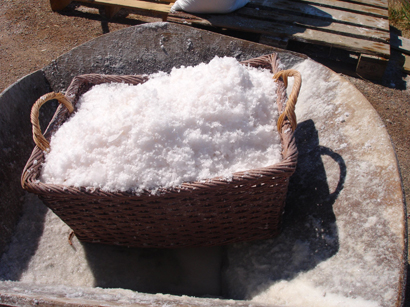 France, Vendée (85), île de noirmoutier, pure Salt. Pinpin 20:24, 19 September 2006 (UTC)By Dr. John
France, Vendée (85), île de noirmoutier, pure Salt. Pinpin 20:24, 19 September 2006 (UTC)By Dr. John
So, which is it, limit the salt or not? Several reports have appeared this week on the health effects of dietary salt. The one that seems to have caught the most attention was the study recently published in the American Journal of Hypertension. As reported by Scientific American on July 8, "a meta-analysis of seven studies involving a total of 6,250 subjects … found no strong evidence that cutting salt intake reduces the risk for heart attacks, strokes or death in people with normal or high blood pressure." This was viewed by many as absolving salt of any significant health impact. Indeed, the declarative title of the Scientific American article seemed to leave no doubt: It’s Time to End the War on Salt. However, medicine and science are rarely that easy.
On July 12, writing in the Forbes blog CARDIOBRIEF, Larry Husten reports on a study published in July 11 issue of the Archives of Internal Medicine which included twice as many subjects - "12,267 adults participating in the 3rd National Health and Nutrition Examination Survey." This study found that the sodium-potassium ratio was the important factor and that “a high sodium intake, especially when combined with a low potassium intake, is associated with an increased risk of cardiovascular disease (CVD) and mortality.” Husten's post includes the AMA press release which concludes:
In summary, our findings indicate that higher sodium-potassium ratio is associated with significantly increased risk of CVD and all-cause mortality in the general US population,” write the authors. “Public health recommendations should emphasize simultaneous reduction in sodium intake and increase in potassium intake."
There is good news for modern Paleolithic nutrition which refrains from processed foods and includes plenty of fruits and vegetables:
The authors point out that salt is frequently added to processed foods, thereby increasing the sodium-potassium ratio, while fruits, vegetables and dairy products tend to have a lower ratio.
So, there you have it. Time for more studies or just eat your fruits and vegetables?!
 Thursday, December 20, 2012 at 09:40AM
Thursday, December 20, 2012 at 09:40AM  Diabetes,
Diabetes,  Obesity,
Obesity,  cardiac health,
cardiac health,  high blood pressure in
high blood pressure in  Fitness
Fitness 

